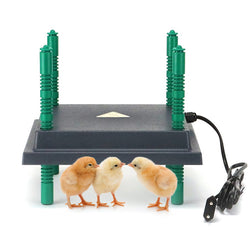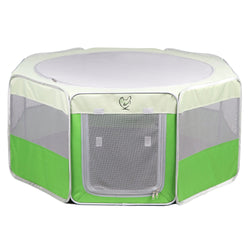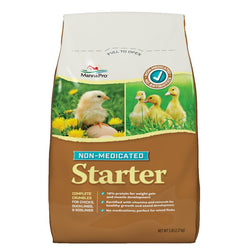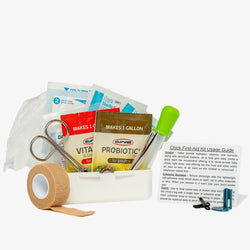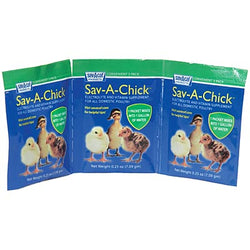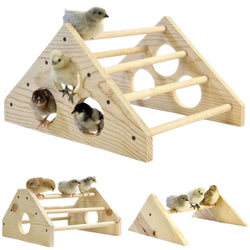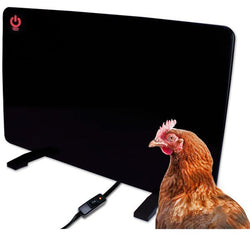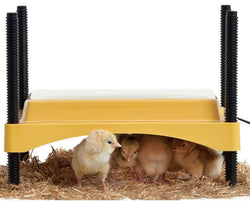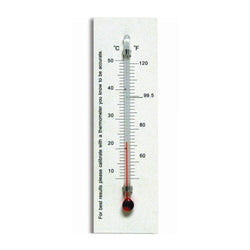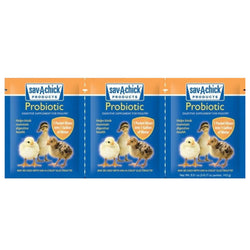The 6 Important Habits of Successful Small Flock Owners
Back to blog
Successful small flock owners may have vastly different management styles. Some may hatch their own birds, while others may order from a hatchery or buy from a breeder. Some small flock owners will free range their birds, while others--just as successful--may provide confined range. Some add supplemental light in the winter, while others let their birds experience the natural cycle of light and darkness. Some may keep all one breed, while others keep many different breeds for many different colors of eggs!
Even though management styles and preferences can differ considerably, there are six habits that successful small flock owners all seem to have in common:
1. Being a successful small flock owner starts with the good habit of advance preparation. Before making any move to purchase or acquire chickens, you'll want to have everything on hand before you need to use it. For instance, successful flock owners may have their brooders prepared before they place an order for chicks, or visit a local feed store/breeder to acquire them. The reason is simple: they don't want to find that they have a brood of baby chicks before they have their feed or their heat lamp. They don't want a group of almost fully grown chickens--and no coop to move them to! Can you deal with things like that on the fly, under time pressure? Maybe... but that's just not ideal, or even wise. Just like you wouldn't want to bring a new baby home without a proper crib, you don't want to worry about keeping your chicks in an area without a heat lamp set up in a way that provides them a safe, secure environment. Can you try making a pillow barricade on a sofa as a place for your new infant to sleep? Sure. But you risk a lot going wrong with a jerry-rigged crib, just like you risk a lot going wrong with a jerry rigged brooder.
2. Successful small flock owners not only understand what can go right, but what can go wrong. They're in the habit of planning for contingencies. Making plans for a new flock can be fun, but dealing with what happens when things don't go according to plan is much less so. For instance, what happens if your baby chicks are safe and sound in their awesome new brooder at the perfect temperature with their heat lamp... but the power goes out in a storm? There goes the heat! What happens if you hatch eggs at home for your new laying flock... but you end up hatching mostly males? There goes the laying flock! What happens if you order all female chicks because you can't have roosters in your area, but receive a sexing error with your order? There goes your peace of mind! Being a successful small flock owner doesn't mean that everything always goes according to plan. It does mean being prepared when plans don't work out.
3. Successful small flock owners give their chickens plenty of space--and they have the good habit of keeping that space clean and tidy. Some people want to regard chickens simply as little egg factories, just inanimate objects ready for exploitation. They're not that, no! They're living, breathing creatures and they have preferences, affections and feelings just like other pets do. Happy, healthy chickens lay better--and more--eggs. A chicken that is stressed or ill from overcrowding and dirty conditions is more likely to lay fewer eggs--and more likely to get ill--than chickens kept in sanitary, spacious environments. Even in the very best of small flock conditions, your chickens can get thrown off laying for a few days by the stress of a loud thunderstorm at night; long term stress can lead to illness in humans, too, remember! And chickens are creatures of habit themselves, that don't always like change! Something as innocuous as a new, unfamiliar feeder--or even a coop cleaning!--can cause them to be upset and persnickety. You can't avoid every stress! But you can be understanding of what makes them comfortable or uncomfortable, and do your best to give them plenty of clean space that will keep them happy, healthy and low in stress.
4. Successful small flock owners provide the best nutrition for their flock: balanced feed, access to pasture and small amounts of healthy treats for variety. However, it's easy to offer your flock too many treats, just like it's easy to give your dogs and cats so much "people food" that it upsets their digestion. They want it, right? They often just BEG for it. And stopping at McDonald's for the kids, rather than making a balanced, nutritious meal, can be very tempting for some people. Truthfully, there's nothing wrong with a special treat every now and then. But you don't want your dogs, cats or kids to gorge on nothing but potato chips and other empty-calorie-foods, no matter how much they love them! Similarly, you don't want your chickens to gorge on pasta, bread--or even large amounts of fruits and veggies--because it's just not a balanced diet for them. Chickens need a lot of protein, in addition to a good balance of vitamins and minerals, to be healthy and lay well. For most successful small flock owners, a simple commercial layer feed is the answer. Organic feed is even better! Then, the flocks of successful small flock owners also have some access to pasture or the outdoors, where the birds can forage on grass and bugs and other delicious chicken "treats" that they have found for themselves. For those whose birds don't have access to a yard, a healthy treat like a dried bug blend can be a great supplement.
5. Successful small flock owners have a habit of spending some time watching their flock every day--or most days--so they recognize unusual behaviors when they occur. Unlike many other pets, chickens are fairly adept at hiding signs of illness. They are prey animals, and when there are predators around, they often want to choose the weakest chicken as their target.
That means that your chicken's instinct is to avoid appearing weak or ill as long as possible, so signs of illness can be subtle and hard to pick up on if you don't spend much time chicken watching. General signs of illness include lethargy, ruffled feathers, a pale comb, and spending time alone in the coop, when maybe they would usually be out foraging, socializing, dust bathing or the like. Early signs of illness in chickens are generally small signs, so successful small flock owners keep their eyes open, and know their birds well enough to notice early that something is different. Do ruffled feathers or unusual behavior always mean an illness? No. Broody birds may exhibit very similar symptoms. However, flock owners with a good eye will be able to identify that there is a potential problem early, when possible veterinary treatments can do the most good, if they are necessary. Successful flock owners are prepared to provide first aid and know where to seek veterinary advice when necessary!
6. Successful flock owners make good biosecurity a habit! They buy their birds from a reputable NPIP hatchery or breeder, and if they adopt rescue birds, they're aware of quarantine recommendations--and follow them religiously. They teach their children about good, common sense biosecurity, too: after handing chickens or chicken equipment, they wash their hands. They clean and sanitize shoes that have walked in chicken droppings (just like you would clean and sanitize shoes that stepped in dog or cat poo). They're not only aware of possible symptoms of illness (#5, above), but they also know what symptoms are especially concerning. _____________________ What other good habits would you recommend for a successful small flock? Please share in the comments.
